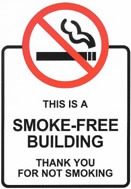Without smoke-free ordinances in all local areas, some restaurant owners and managers struggle with the decision to go 100% smoke-free and are often stunned when they learn that they won't actually lose business by adopting a smoke-free policy.

If our restaurant goes smoke-free, we'll lose business.
On the contrary, research has shown that adopting smoke-free policies doesn't have a negative effect on restaurant sales. Almost 74 percent of South Carolinians are nonsmokers and an increasing number say that they prefer dining in restaurants that are smoke-free.
Our restaurant has a non-smoking section. That will eliminate health risks, right?
Even with smoking and nonsmoking sections separated by a solid partition, secondhand smoke is still a serious risk to customers. With over 4,000 toxic chemicals in cigarettes, there is no safe level of exposure. Each year, 53,000 American nonsmokers die from secondhand smoke.
Our smoking section is ventilated. Isn't that all the protection non-smokers need?
Ventilation systems are designed to remove the odor of smoke rather than the dangerous disease-causing chemicals and gases in the air. Just because the nonsmoking section isn't hazy with smoke doesn't mean customers aren't at risk, especially small children, the elderly and people with breathing conditions like asthma.
I've heard it's expensive to implement a nonsmoking policy.
Going smoke-free is easy and costs very little! Explaining your new policy to your customers doesn't require anything except showing your commitment to smoke-free air and posting smoke-free signs in prominent places.
If my restaurant goes smoke-free, we'll lose our regulars.
Smoke-free restaurants report that even their most dedicated smokers return after a short period of time. And the smokers you may lose as customers will be made up for with nonsmoking customers who've heard about your new policy and are eager to eat in a smoke-free environment.
The health of our staff isn't my problem. They make a choice to come work here. I can't be held financially accountable for their welfare.
Restaurant employees are the work force most heavily exposed to secondhand smoke. South Carolina's waiters and waitresses, hostesses and chefs are 50% more likely to develop lung cancer than people in other professions. If you knowingly allow your employees to work in a dangerous environment, you could be held financially responsible for any future health problems they may develop as a result of secondhand smoke.
Okay, I understand how a restaurant could go smoke-free. But my restaurant also has a great bar. There's no way a bar can be smoke-free. 
Seventy-four percent of South Carolinians don't smoke and the same figure applies to bar-goers. When nonsmokers are asked why they don't visit bars more often, smoke is the number one answer. In fact, many nonsmokers say they'd go out to bars more if they were smoke-free.
So, maybe going smoke-free won't cost me anything. On the other hand, it won't save me money either.
Going smoke-free will save you money. Savings in maintenance and repairs, upkeep and insurance including fire insurance premiums. You'll also save with your employee's overall health, productivity and loss of work.
I don't want to be the only one. No other South Carolina restaurants are going smoke-free.
You're not alone. As of July 1, 2013, 51 municipalities in SC will have implemented smoke-free ordinances at the local level that provide for all worksites to include restaurants and bars to be smoke-free.